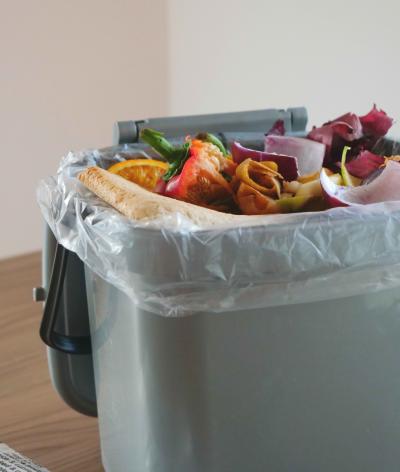About the service expansion
We introduced a food waste recycling trial service for around 7,000 households during autumn 2019 until February 2022, collecting over 700 tonnes of food waste to be recycled in total.
Following the success of the trial, we have been introducing a permanent food waste recycling service to residential properties across Westminster since March 2022.
Why did we introduce the food waste recycling service?
Food waste recycling is an important part of increasing the amount of waste we recycle, which reduces our impact on the environment and helps to tackle climate change. We also know that around 30% of material in the average rubbish bin is food waste. We’d like to thank all our residents who have used the service so far.
Additionally, recent national legislation (Environment Act, 2021) will shortly require local authorities to offer a weekly food waste recycling collection service to all residential properties.
Please complete our online form to receive updates about our food waste recycling service.
Where have we introduced the service?
We started rolling out the food waste service in March 2022 and have rolled out the service to suitable households. If your household is suitable, you should have received direct communications from us about the service and should now have received an initial delivery of food waste liners and containers.
If your property has not yet had the service introduced, please contact the Recycling Team on [email protected] or our call centre on 020 7641 2000.
Marylebone, St James’s and West End wards
Within these wards we mainly introduced our communal housing estate and mansion block services, our neighbourhood bin service and on-demand food waste booking service for suitable properties in during 2023.
Westbourne (south of Westway only), Bayswater, Lancaster Gate, Hyde Park and Knightsbridge and Belgravia wards
From the end of January 2023 we started to introduce our kerbside, communal housing estate and mansion block services and our neighbourhood bin service to suitable properties in these wards.
Vincent Square, Pimlico North and Pimlico South wards
We started to introduce our kerbside, communal housing estate and mansion block services and our neighbourhood bin service to suitable properties within these wards from November 2022.
Westbourne (north of Westway only), Church Street, Maida Vale and Little Venice wards
From the end of May 2022 in a staggered approached we introduced our kerbside, communal housing estate and mansion block services and our neighbourhood bin service to suitable properties in these wards.
Abbey Road, Regent’s Park, Queen’s Park and Harrow Road wards
We introduced to suitable properties within these wards our kerbside, communal housing estate and mansion block services from March 2022.
Why does my property not have the food waste recycling service?
Sometimes we cannot offer a direct food waste recycling service collection from properties because of the lack of space to store and leave the bin for collection, or it could be that we are waiting for your managing agent or property management company to approve the introduction of the service.
During 2024 we will be working to ensure as many of our residents as possible can recycle their food waste.
Please contact the Recycling Team to check the service arrangements for your individual property on [email protected], or please call our contact centre for further information on 020 7641 2000.
Why are we doing this?
Around 30% of the rubbish that we throw away is food waste. By using the new service, your food waste can be recycled, which will help reduce our impact on the environment and helps to tackle climate change.
Since introducing the food waste recycling service, Westminster’s household recycling rate has increased to 24.6% (2022/23)
For information about our commercial food waste recycling services for businesses visit our webpage.
How can I get more liners?
Please see the information on using the food waste service page.
Where does the food waste go?
Everything collected is sent for processing in an anaerobic digestion plant outside of London. This plant uses food waste to create biogas, a renewable energy source used to generate electricity to power the national grid, and heat homes. This plant will also transform the food waste into a biofertiliser, which will be used on farmland to grow more food.
How can I reduce my food waste?
Westminster City Council is proud to be part of Eat Like a Londoner. It's a first-of-its-kind food platform for Londoners. It’s designed to help Londoners shop, cook and eat better: more sustainably, more cost-effectively, more deliciously. With recipes, hacks, tips and tricks – from experts and locals alike – this is the ultimate destination for anyone looking for new ways to cook, plan or save food.
Please visit Eat like a Londoner: Save money. Eat better. Help the Planet. to find out more.

